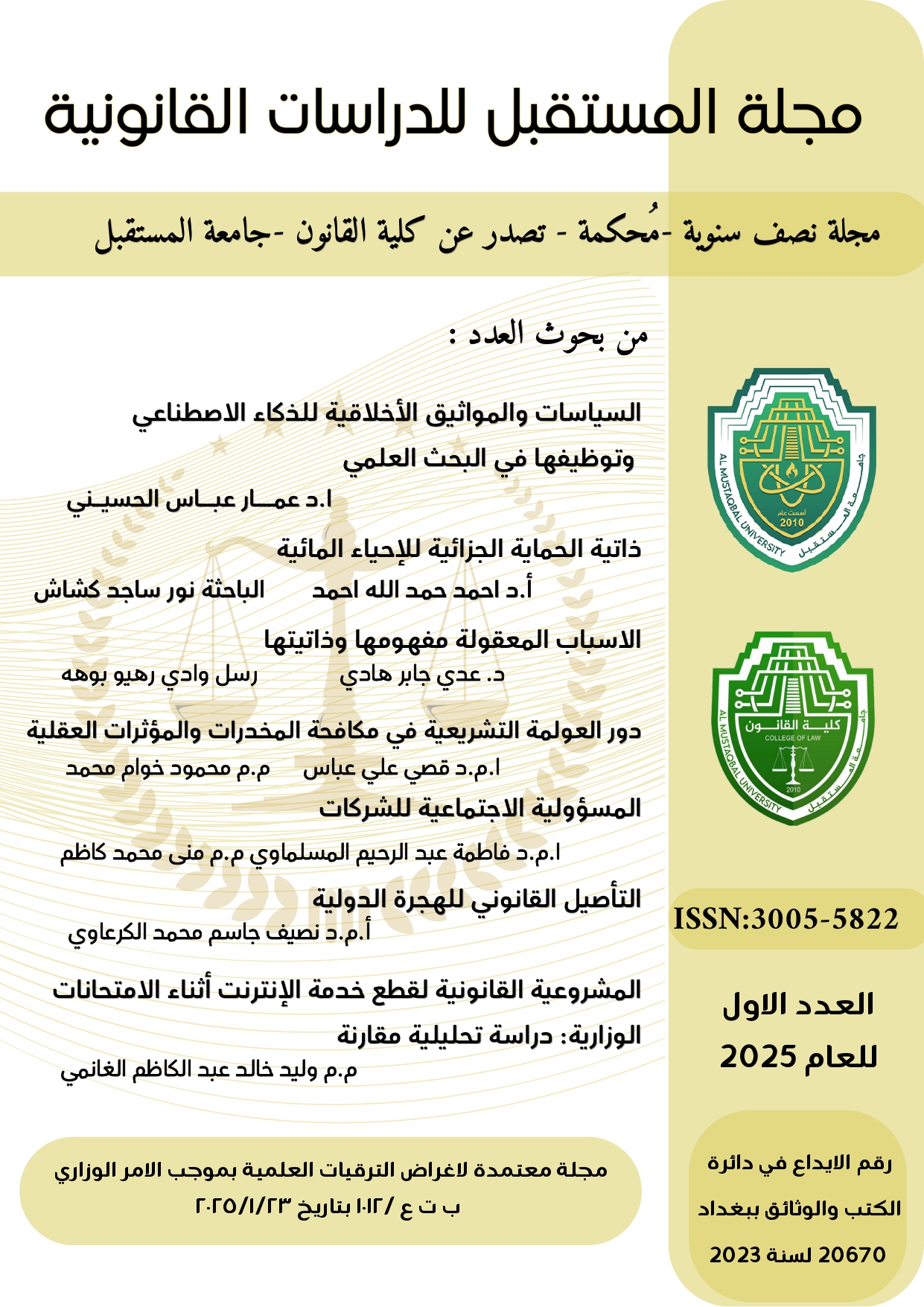Abstract
This research explores “Policies and Ethical Charters of Artificial Intelligence and Their Application in Scientific Research – A Comparative Legal Study in the Philosophy of Law and Ethics”, undertaken in alignment with the fourth and sixteenth Sustainable Development Goals.
The study begins by examining the very notion of artificial intelligence, its different levels, and the concept of ethical policies in this domain. It highlights their importance, the core principles on which they rest, and presents illustrative models adopted by both international organizations—such as the United Nations, the European Commission, UNESCO, the Organization of Artificial Intelligence, and the Organization for Economic Co-operation and Development—and by several countries, including South Korea, Jordan, Egypt, Saudi Arabia, and the United Arab Emirates.
In its second part, the research turns to the practical question of how these broadly framed ethical principles can be adapted and employed within the sphere of scientific research. Since most of these charters are formulated in general terms, they are not tailored to specific areas of artificial intelligence, which makes it necessary to reinterpret them for research purposes.
The choice of this subject is not arbitrary. It stems from the growing importance of artificial intelligence technologies and the exponential expansion of their use in countless fields, which raises urgent questions about how to regulate the problems, harms, or even crimes that may arise. In the absence of clear, specialized legislation to govern such matters, ethical charters have emerged as provisional frameworks, setting out value-based norms and general boundaries.
Furthermore, as artificial intelligence increasingly permeates scientific research, there arises an even stronger need for normative ethical rules to guide programming, development, manufacturing, and use. Such rules are vital to ensure a fair balance: to harness artificial intelligence as a force for human progress while at the same time mitigating the risks and harms that may accompany it.
The study begins by examining the very notion of artificial intelligence, its different levels, and the concept of ethical policies in this domain. It highlights their importance, the core principles on which they rest, and presents illustrative models adopted by both international organizations—such as the United Nations, the European Commission, UNESCO, the Organization of Artificial Intelligence, and the Organization for Economic Co-operation and Development—and by several countries, including South Korea, Jordan, Egypt, Saudi Arabia, and the United Arab Emirates.
In its second part, the research turns to the practical question of how these broadly framed ethical principles can be adapted and employed within the sphere of scientific research. Since most of these charters are formulated in general terms, they are not tailored to specific areas of artificial intelligence, which makes it necessary to reinterpret them for research purposes.
The choice of this subject is not arbitrary. It stems from the growing importance of artificial intelligence technologies and the exponential expansion of their use in countless fields, which raises urgent questions about how to regulate the problems, harms, or even crimes that may arise. In the absence of clear, specialized legislation to govern such matters, ethical charters have emerged as provisional frameworks, setting out value-based norms and general boundaries.
Furthermore, as artificial intelligence increasingly permeates scientific research, there arises an even stronger need for normative ethical rules to guide programming, development, manufacturing, and use. Such rules are vital to ensure a fair balance: to harness artificial intelligence as a force for human progress while at the same time mitigating the risks and harms that may accompany it.
Keywords
Keywords: Artificial Intelligence – Ethical Policies and Charters – Legal Responsibility – Scientific Research – Philosophy of AI Ethics – Robot.
Abstract
يتناول هذا البحث \"السياس السياسات والمواثيق الأخلاقية للذكاء الاصطناعي وتوظيفها في البحث العلمي \"دراسة قانونية مقارنة\" \" دراسة في فلسفة القانون والأخلاق تحقيقاً للهدفين الرابع والسادس عشر من اهداف التنمية المستدامة – وذلك من خلال البحث في مفهوم الذكاء الاصطناعي ومستوياته، وكذا مفهوم السياسات الأخلاقية في مجال الذكاء الاصطناعي وأهميتها وأهم مبادئها، ثم نماذج منها سواءٌ على مستوى بعض المنظمات الدولية او بعض البلدان وذلك في المبحث الأول من البحث، وفي المبحث الثاني قمنا بتوظيف وتطويع هذه المبادئ والسياسات الأخلاقية، في مجال البحث العلمي، نظراً لأنها جاءت بعبارات وصياغات عامة لا تختص بمجال معين من مجالات الذكاء الاصطناعي.
وقد جاء إختيارنا للبحث في هذا الموضوع إنطلاقاً من عدة إعتبارات أبرزها تعاظم أهمية تقنيات وتطبيقات الذكاء الاصطناعي وتضاعف إستخداماته في مجالات لا تقع تحت حصر، مما يوجب وضع إطار يضبط ما قد ينجم عن هذه التقنيات من مشكلات او جرائم او أضرار، وهو ما توافرت عليه مواثيق وسياسات الذكاء الاصطناعي التي عَملت على وضعها بعض المنظمات الدولية ومنها الأمم المتحدة والمفوضية والاوربية واليونسكو ومنظمة الذكاء الاصطناعي ومنظمة التعاون الاقتصادي، وكذا بعض البلدان ومنها كوريا الجنوبية والأردن ومصر والسعودية والامارات، وذلك في ظل غياب تشريعات واضحة ومتخصصة لمواجهة ما قد يقع من حوادث او جرائم او أضرار للذكاء الاصطناعي، بل وحتى إستخداماته، ومن الأسباب التي دعتنا الى هذا البحث، تعاظم إستخدامات الذكاء الاصطناعي في مجال البحث العلمي مما يوجب توظيف قواعد قيمية وأخلاقية – معيارية لتنظيم برمجة وتطوير وتصنيع وإستخدام تقنيات وتطبيقات الذكاء الاصطناعي .
وقد جاء إختيارنا للبحث في هذا الموضوع إنطلاقاً من عدة إعتبارات أبرزها تعاظم أهمية تقنيات وتطبيقات الذكاء الاصطناعي وتضاعف إستخداماته في مجالات لا تقع تحت حصر، مما يوجب وضع إطار يضبط ما قد ينجم عن هذه التقنيات من مشكلات او جرائم او أضرار، وهو ما توافرت عليه مواثيق وسياسات الذكاء الاصطناعي التي عَملت على وضعها بعض المنظمات الدولية ومنها الأمم المتحدة والمفوضية والاوربية واليونسكو ومنظمة الذكاء الاصطناعي ومنظمة التعاون الاقتصادي، وكذا بعض البلدان ومنها كوريا الجنوبية والأردن ومصر والسعودية والامارات، وذلك في ظل غياب تشريعات واضحة ومتخصصة لمواجهة ما قد يقع من حوادث او جرائم او أضرار للذكاء الاصطناعي، بل وحتى إستخداماته، ومن الأسباب التي دعتنا الى هذا البحث، تعاظم إستخدامات الذكاء الاصطناعي في مجال البحث العلمي مما يوجب توظيف قواعد قيمية وأخلاقية – معيارية لتنظيم برمجة وتطوير وتصنيع وإستخدام تقنيات وتطبيقات الذكاء الاصطناعي .
Keywords
الكلمات المفتاحية : الذكاء الاصطناعي – السياسات والمواثيق الأخلاقية – المسؤولية القانونية – البحث العلمي – فلسفة أخلاقيات الذكاء الاصطناعي – الروبوت .
